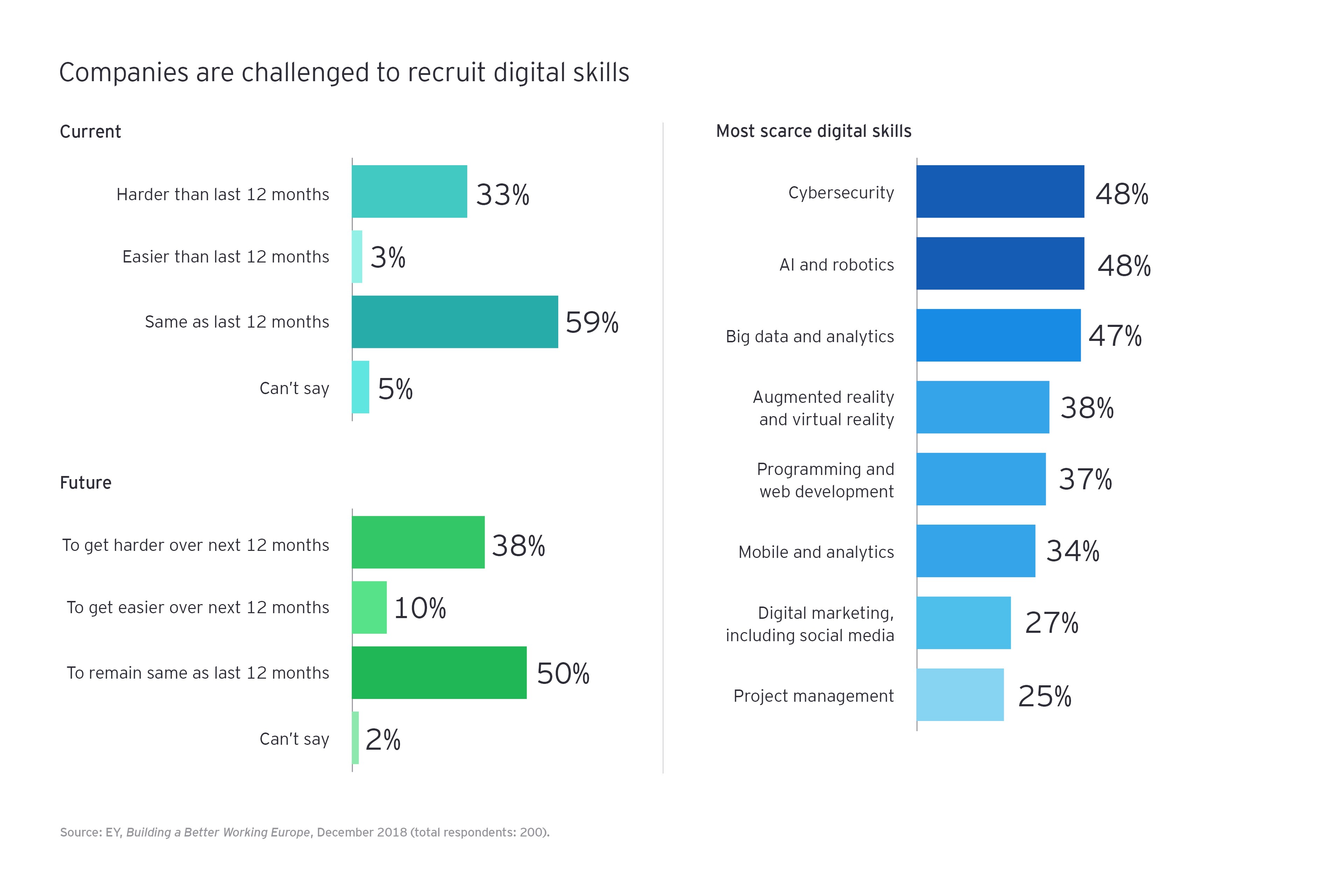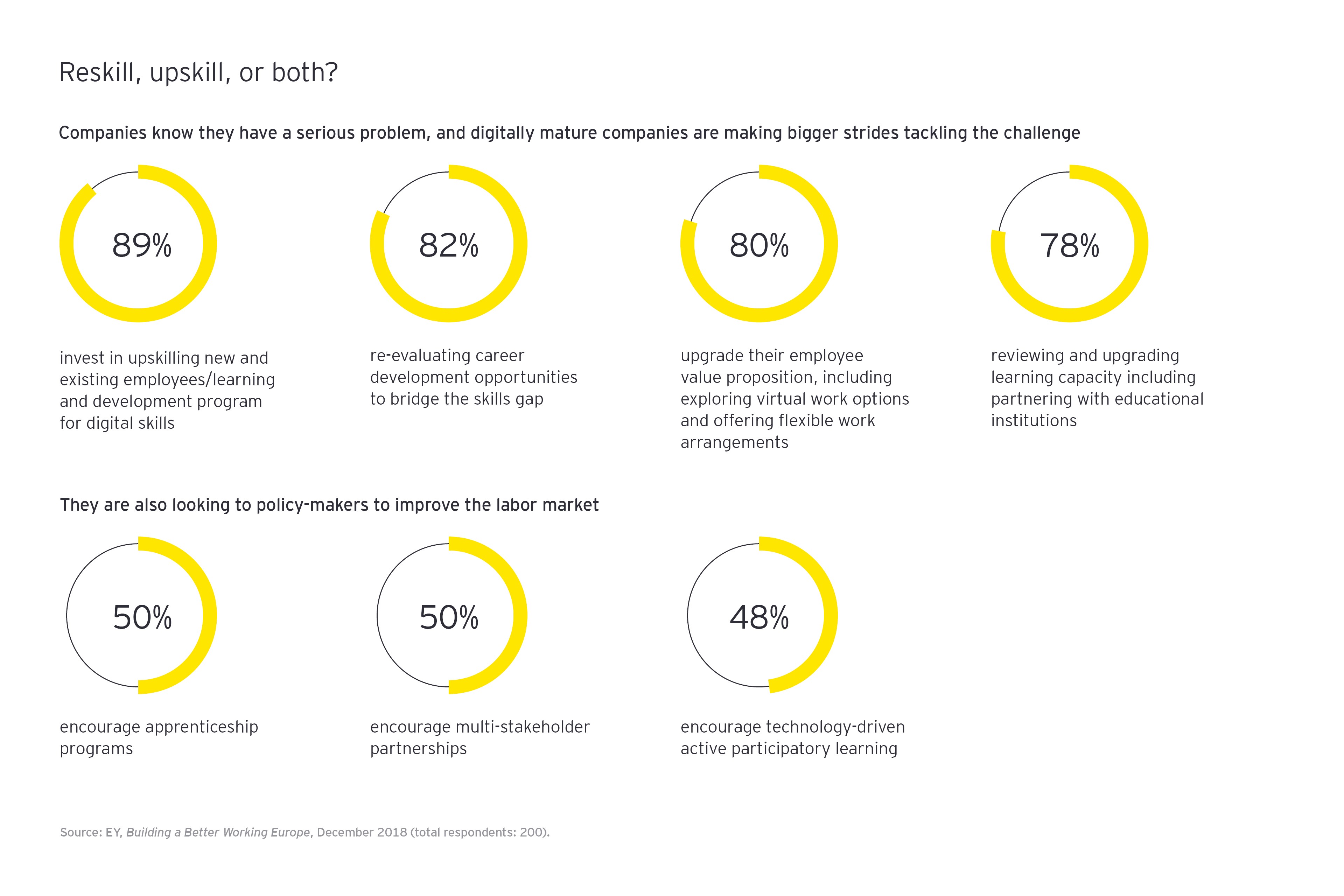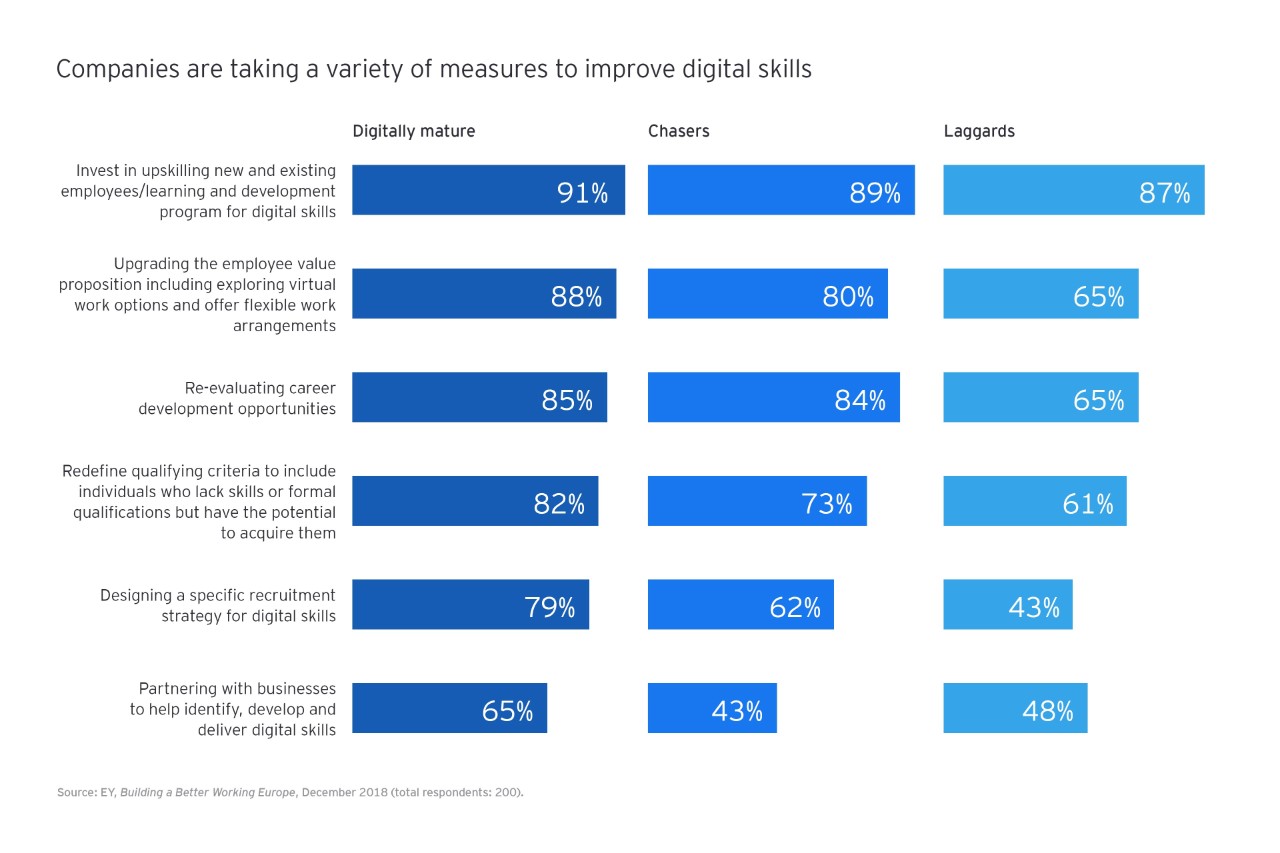
Chapter 1
How can you protect your future growth in a changing labor market?
The digital economy will be the dominant driver of Europe’s growth in years to come, but skills shortages are damaging Europe’s growth potential.
The digital economy will be the dominant driver of Europe’s growth in years to come. However, a skills shortage in the most important jobs needed to harness it is damaging the ability of the continent’s businesses to grow. At a time when a digital transformation is creating huge new opportunities for employers, they are finding it increasingly difficult to recruit and retain employees with the skills that will enable them to embrace fully the benefits this transformation brings.
Without those skills, our respondents believe businesses may struggle to thrive in a world of increasing economic uncertainty. This in turn will impact the continent’s overall economic growth prospects — and its ability to compete in world of relentless, intense and increasingly global competition.
Skills shortages are damaging firms across some of their key business metrics, according to survey respondents. Nearly three-quarters of those taking part said skills challenges impacted their business’s productivity and profitability. Two-thirds said shortages had an impact on revenue growth, and on how much they could invest in new products and services. Skills shortages can pose a real risk to a company’s future health.
Related content
Skills shortage
73%Respondents who say a shortage of skills is impacting productivity and profitability
However, it isn’t just the number of job vacancies that employers struggle to fill — it is the type of jobs they find difficult to recruit for that can cause the biggest headache. Many of the shortages are in roles that are core to a company’s digital transformation. For example, the survey found the biggest reported difficulty was in finding employees with skills in cybersecurity.
With headline-grabbing stories about the impact of attacks on companies — and their customers — a focus on the need for such jobs is understandable. Nevertheless, other skills that help with a digital transformation are also in short supply. Employees who are able to analyze the big data that is being unleashed by the world of Industry 4.0 which can help them better understand consumer trends, are also hard to find, as are those with expertise in AI and robotics. In total, more than 40% said it was hard to recruit the right talent to drive a digital transformation.
Talent pool
46%Respondents who say that rapid pace of innovation and new technologies is the single greatest barrier to recruitment.
There is also evidence that the situation is likely to become increasingly challenging in the future, as more and more employers compete to find digitally skilled employees. Of those we surveyed, 10 times as many expect the recruitment challenge to get harder in the future as those who expect things to get easier. The message from employers across Europe is the same: they are struggling to hire the right people with the right range of skills, a situation that is only going to get more difficult in the years ahead. In short, the jobs market simply doesn’t seem to be adapting fast enough to the pace of technological change that is sweeping industry.

So how best to overcome these issues, resolve skills shortages and help companies with their digital transformation? Governments, universities and other education providers all have a role in working together to solve this problem. There needs to be greater investment in upskilling employees for the new world, and in making the labor market better able to adapt to provide the range of skills that will be needed. Most importantly, however, business itself needs to change the way it addresses these issues.

Chapter 2
Is your talent a topic for the boardroom?
Talent has become a strategic issue. To face the future, businesses must align their digital and people strategies and ensure change is driven from the top.
Most businesses are aware of the potential for the digital revolution to disrupt their business. They understand that the huge increase in data available can give them far greater insights into their customers’ behavior — provided it is analyzed rigorously. They see the impact that robotics and machine-learning algorithms can have on their processes and supply chains. And they know that connected consumers have access to more information than ever before to inform their purchasing habits.
In other words, they know they must evolve, rapidly, in a digital age to survive and grow.
Curiously, however, our survey finds that many businesses’ people and digital strategies have not evolved with anything like the speed, nor to anything like the extent, required to take these opportunities. There is a growing disconnect between companies’ digital strategies and the processes they have in place to recruit the right people to achieve them. The potential benefits that digitalization brings instead risks becoming an existential threat to the company’s future.
Although 60% of companies say they have a business plan that includes an element of technology-led transformation, there is a “long tail” of laggards: just under a third say they don’t have such a strategy. In addition, only a minority of companies are currently giving the opportunities and threats posed by digitalization the attention they deserve.
People strategy needs to become an integral part of organizational strategy and a topic of boardroom conversation.
While just over half of businesses surveyed have a chief digital officer or a chief information technology officer, less than two-thirds of them sit at board level. The vast majority of businesses don’t seem to have anyone senior to promote the importance of embracing the digital world at the highest levels. Digital representation also has the potential to bring younger, digital natives into the boardroom offering fresh perspectives and an understanding of tech savvy customers.
Furthermore, many are making insufficient effort to ensure the right people are hired. When it comes to having an appropriate “people” strategy to execute the digital strategy, again the picture is mixed. Many are making insufficient effort to ensure the right people are hired. While 57% said they had a people strategy as part of their digital and technology transformation, more than a third of those surveyed said they did not. Without that, it is perhaps unsurprising that the issue of addressing skills shortages doesn’t get the attention it deserves. So, many companies have yet to fully grasp the potential for business transformation, or put in place systems to achieve it.
In total, only 17% of those we surveyed are truly “digitally mature”: they have a board-level technology “champion” as well as a people strategy that forms part of their transformation strategy. Digitally mature companies tend to have higher productivity, lower staff turnover and better top-line growth. As might be expected, the technology and financial services sectors — the industries most exposed to competition and innovation — are in the vanguard of those appreciating the need to think of this at a strategic level.
In order to drive through change, more businesses need to follow the lead of the digitally mature and adopt a digital transformation strategy. They also need to put in place a people strategy to meet it. Most crucially, they need to make sure it is driven from the highest level, meaning the boardroom. In order to ensure a company is equipped to face the future, the responsibility for ensuring it can attract and retain the right employees needs to be given a significantly higher priority. People strategy needs to become an integral part of organizational strategy and a topic of boardroom conversation.
Strategy disconnect
43%Respondents whose firms have an HR strategy that looks more than three years ahead
Business also, however, needs to follow the practice of industry leaders and take a longer-term perspective on the issue. Less than half of those we surveyed have a people strategy that looks out over a timeframe of more than three years.
Boards need to rethink how they attract and retain the right employees — starting with how they plan ahead for the future. The good news is that having a better people strategy can address skills scarcity and have a positive impact on a firm’s future. The better news is that those companies that are digitally mature are already showing the way.

Chapter 3
Should you invest in skills or the ability to learn them?
Training and upskilling will be more effective than seeking perfect candidates.
Our research shows skills shortages, particularly in the jobs that are vital for a company’s digitalization programs, can hold a company back and have a negative impact on business performance. A properly executed people strategy, as well as a longer-term timeframe, can help businesses meet these concerns. As part of that strategy, the right recruitment, education and training programs are also needed to help businesses meet their objectives.
At the moment, what is stopping them from attracting the right people? The rapid pace of innovation and the adoption of new technologies is currently the biggest barrier: firms appear unsure about what exact skills they will need in the future. Increasingly, however, companies’ reliance on traditional approaches for sourcing digital skills means they are failing to use the right channels to attract the people they need.
Our survey shows that companies appear to recognize that they have a problem with skills shortages. The best companies are already embracing active learning strategies and taking steps to ensure their staff are equipped for their digital transformation. Nearly 90% say they are investing in improving the digital skills of existing and new employees. That is particularly true for digitally mature businesses, the majority of which are also designing specific recruitment strategies for digital skills and partnering with other businesses to help identify, develop and deliver them.
Related content

In addition, they are re-evaluating their employees’ career development opportunities, upgrading the employee value proposition, including offering more flexible working, and redefining the qualifying criteria to include individuals who lack some required skills or formal qualifications but have the potential to acquire them. Equipping their employees with core digital skills is essential for a company’s digital transformation.
But our survey also shows that is not enough: other, perhaps “softer” skills are also important. These include having an innovative and entrepreneurial mindset, being agile and adaptable, and having the right social skills for the workplace.
Ensuring employees are able to help with your digital transformation is all well and good at a company-specific level. But how do you go about ensuring there are more employees with the right skills to go around the whole economy? How does society not just learn to deal with skills shortages, but actually close the gap between the jobs that companies need and the employees with the most appropriate skills to fill them?
Our survey shows that business cannot solve this problem alone. Society-wide problems need society-wide solutions. So business needs to work with others to effect change, including governments and education institutions. Companies are expecting government policy initiatives to support changes in the labor market and encourage multi-stakeholder partnerships, from developing more apprenticeship programs to promoting participation of women in STEM degrees.


Chapter 4
5 steps to transform the workforce
Countries, government, business and education must cooperate to build future talent, drive change from the top, and reskill or upskill to close the digital skills gap.
The digital transformation offered by Industry 4.0 means the world of work is in the middle of fundamental change that is unprecedented in recent years. The skills shortage in the digital jobs so vital for businesses to thrive is a significant impediment to their success. The demand for these skills is only going to grow further, meaning the recruitment problem is likely to get worse before the labor market catches up. And the pace of change is set to quicken. Unless things change, businesses will be held back just when their opportunity to leap forward is at its greatest.
Overcoming this requires action from government and education — and companies themselves.
Now is the time for Europe to be bold. Building a better working Europe calls for an aspirational ambition for the digital future – one that addresses the imbalance in the labor market by recognizing human capital as a core asset and driving inclusive growth through the right education, and upskilling and reskilling of young and old alike.
1. Government must act as a catalyst for change
By promoting a new policy initiative for a strategic, durable and forward-looking alliance between business and educational institutions, government can help to build the talent for tomorrow.
2. Cross-border collaboration is essential
The current imbalances suggest that digital literacy should not sit only at a local or national level and that collaboration across borders is essential to bridge the gap between the old and new economy. The European Union institutions have a crucial role to play in facilitating and promoting a structural collaboration, and the exchange of knowledge and best practice among stakeholders.
3. Businesses must actively address the skills gap
Raising awareness and government support is particularly essential for less digitally mature companies, particularly Small and Middle Enterprises (SMEs), that often lack the required investment.
However, there are important steps for businesses to take if they are to close their skills gap. Ensuring employees have the right digital knowledge is so crucial to their performance that decisions should be taken at boardroom level. Employing the right people to realize digital opportunities and having a forward-looking view of the capabilities required should sit at the core of a business’s plans for the future. Without this, a company risks being unable to compete on the global stage.
It is right that boards are accountable for such a key driver of their business. For governments and educational institutions to play their part, it is essential they understand business’s future capability needs in order to embed the right learning, tools and apprenticeships to secure the appropriate future talent supply.
4. Employers must be strategic about skills
Employers must undertake strategic workforce planning, and the role of human resources needs to shift. The pace of change means companies must recruit for capabilities rather than roles and be prepared to reskill or upskill.
5. Human resources must evolve
The role of human resources must evolve to manage role disruption; the new generation of human resource professionals must be able not only to evaluate their current requirements but also anticipate any required shifts.
A comprehensive people strategy and a commitment to invest in the recruitment, training and development of key staff are fundamental to help companies overcome their skills shortages. This can help business profitability and performance, and ensure they are ready for a digital future. In partnership with governments and educational institutions, businesses can also ensure that the right skills are made available right across the economy, creating a diverse and vibrant talent pool.
That, in turn, will be good news for future employees — and will help them unlock Europe’s digital growth potential for the benefit of all.
Summary
With digital skills shortages damaging its growth prospects, Europe needs targeted action and collaboration between countries, government, business and education to align people and digital strategies and provide the training to secure and upskill the right talent for tomorrow.


